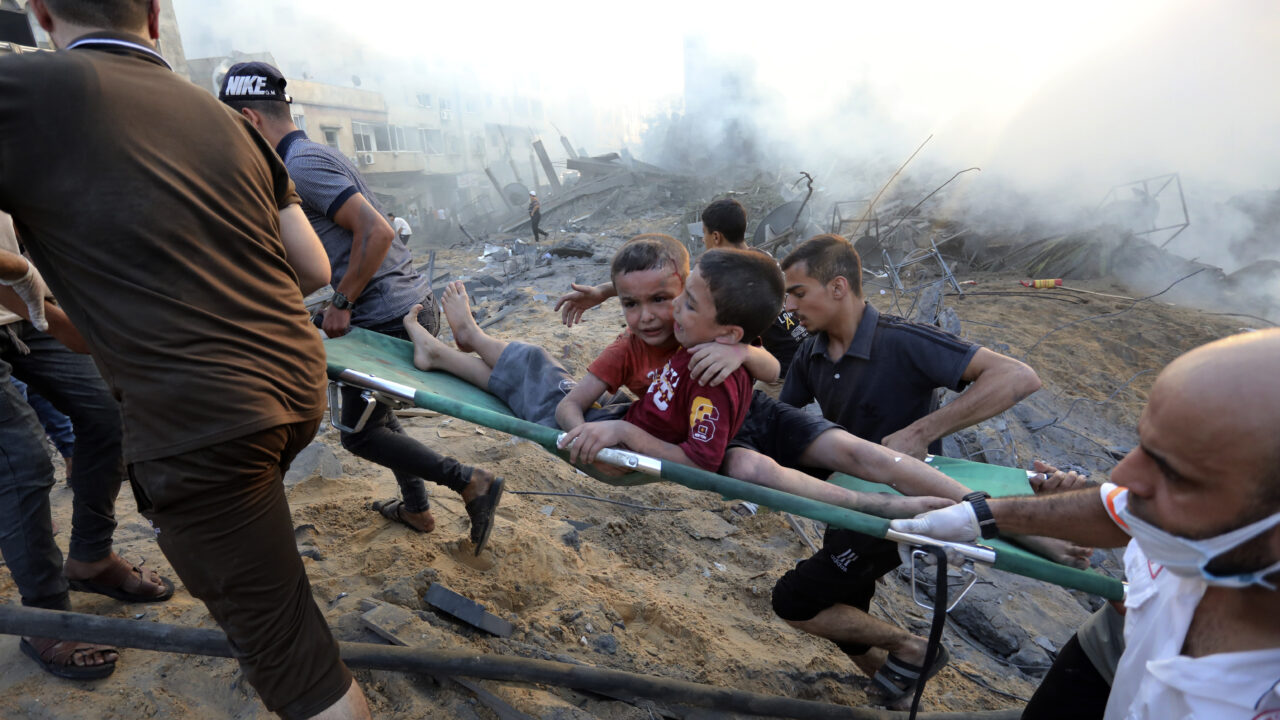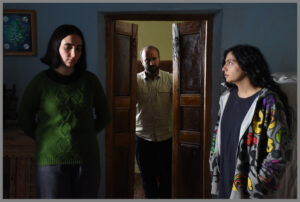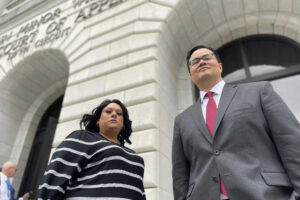The Silencing of Palestinian Voices
As the humanitarian crisis in Gaza worsens, a pattern of suppression is evident toward journalists and employees who advocate for Palestinian rights. Palestinians evacuate two wounded boys out of the destruction following Israeli airstrikes on Gaza City, Wednesday, Oct. 25, 2023. (AP Photo/Abed Khaled)
Palestinians evacuate two wounded boys out of the destruction following Israeli airstrikes on Gaza City, Wednesday, Oct. 25, 2023. (AP Photo/Abed Khaled)
Since the beginning of Israel’s indiscriminate bombing of Gaza in response to the attacks by Hamas on Oct. 7, a growing number of reports highlight a pattern of retaliation and suppression towards journalists and employees who have defended Palestinian rights. These reports highlight the related trend of Palestinian voices being muted in mainstream media, if not ignored altogether.
Leading Palestinian commentators including Noura Erakat, Omar Baddar and Yousef Munayyer have all reported having their cable news appearances cut or canceled on major networks such as CBS and CNN. Munayyer, a Palestinian-American writer and political analyst, told Jewish Currents that he had intended to use a scheduled CBS interview to “raise awareness about the mass atrocities” happening in Gaza and call for an end to the violence, but the producer canceled the appearance when Munayyer made it clear that he intended to offer deeper analysis than simply describing the Hamas attacks as “horrifying.”
Omar Baddar, a Palestinian-American political analyst, recounted a similar experience with CNN International in an Oct. 16 post on the social media site X.
Similar cases have been reported in the world of print journalism. Dylan Saba was commissioned by The Guardian newspaper to write about the censorship of expressions of solidarity with Palestinians, only to be informed on the day of publication that an undisclosed higher-up decided his article would not be published. The decision, wrote Saba, was a “grave indictment of the media response to this critical moment in history” and exemplified what he termed “a wave of McCarthyite backlash.” Meanwhile, The Atlantic, a venerable U.S. monthly, has published 38 articles on Israel/Palestine in the last two weeks, and featured only one Palestinian writer.
A similar skew defines mainstream coverage of the conflict in Europe. The Intercept reported that Upday, Europe’s largest news aggregator, directed its journalists to downplay Palestinian deaths and cover the war in Gaza with a pro-Israel bias.
The restrictive media climate has even set new parameters on “acceptable” advertising. Nathan Thrall, a Jewish American author, recently had ads for his new book on Palestinians pulled from NPR and the BBC. Thrall rebuked the decision by calling out “an atmosphere that is wholly intolerant of any expression of sympathy for Palestinians under occupation.”
Given the hostile environment created by producers and editors, Palestinian journalists have had to make the most of their limited access to media platforms to question the framing of Western networks, and then amplify the critique on social media.
Yara Eid, a U.K.-based Palestinian journalist, used a live interview on Sky News to call out Western media’s misleading framing, double standards and the lack of critical context in its coverage of Israel’s bombardment of Gaza. Her interview has been viewed over 5.5 million times on X.
“You mentioned that this is a Hamas-Israel war — this is not it,” Eid said in the interview. “Framing it as such is very misleading because it poses the thing that Israel is an equal power, but it’s an occupying power and it has the responsibility of protecting all civilian lives and children in Gaza.”
However, social media does not always provide a secure space for free expression. According to Al Jazeera, many social media users around the world have reported censorship of pro-Palestinian posts on platforms such as Facebook, Instagram, X, YouTube and TikTok. Hashtags like “FreePalestine” and “IstandWithPalestine,” as well as language that includes support for Palestinian civilians killed by Israeli bombs, appear to be flags of shadow banning. In some cases, accounts have completely disappeared. A popular Instagram account among Palestine supporters with more than 6 million followers, @eye.on.palestine, which regularly posts images and videos from Gaza, was blocked by Meta on Wednesday after the company said “signs of compromise” were detected.
Journalists aren’t alone in facing consequences for defending Palestinian rights. Paddy Cosgrave, the CEO and founder of Web Summit — Europe’s largest tech conference — was forced to resign after tremendous backlash over a post on X in which he said, “War crimes are war crimes even when committed by allies, and should be called out for what they are.” Michael Eisen, who was editor-in-chief at Cambridge-based science journal eLife, was fired after retweeting a satirical article from The Onion that Eisen said illuminated the “indifference to the lives of Palestinian civilians.”
“Every person fired, every person censured, every opportunity lost for speaking up must double our resolve [to] shut down the war machine that powers Israel’s bombing.”
A culture of fearful conformity is also reported in the inner sanctum of the Biden administration, where staffers — particularly those with a Muslim background — have expressed fear of workplace retaliation for questioning Israel’s conduct during the U.S.-backed Israeli bombing campaign.
While President Joe Biden has touted his administration as historically diverse and open to perspectives from traditionally marginalized communities on matters of foreign policy, one insider told the Huffington Post that this policy does not apply to the bombing of Gaza. “The inner, inner circle on these issues is not at all diverse,” he said. “Does that completely explain the monstrous disregard for innocent Palestinian lives? No, but it’s hard to think these things are entirely disconnected.”
Despite global appeals and overwhelming U.S. public support for a ceasefire in Gaza, President Biden continues to reject the idea, and is instead requesting an additional $14 billion in military aid to Israel, on top of the $3.8 billion the U.S. has already provided this year.
On Thursday, Palestinian health officials said Israel’s siege on Gaza has killed more than 7,000 Palestinians, including nearly 3,000 children. More than 17,000 others have been wounded, nearly half the homes in Gaza have been damaged or destroyed, and over 1.4 million people have been displaced.
“Every person fired, every person censured, every opportunity lost for speaking up must double our resolve [to] shut down the war machine that powers Israel’s bombing,” writes journalist Joshua P. Hill. “Because every time someone is attacked for saying Palestinians are human, too… our point is proven yet again.”
Your support is crucial…With an uncertain future and a new administration casting doubt on press freedoms, the danger is clear: The truth is at risk.
Now is the time to give. Your tax-deductible support allows us to dig deeper, delivering fearless investigative reporting and analysis that exposes what’s really happening — without compromise.
Stand with our courageous journalists. Donate today to protect a free press, uphold democracy and unearth untold stories.









The end goal of the Israeli government is the removal of all Palestinians from within the borders of Israel. Looking at the historical timeline, as shown over at Al Jazeera and elsewhere, one can see how this Israeli intent has played out. The bombing of Gaza is just part of the overall plan to achieve that goal.